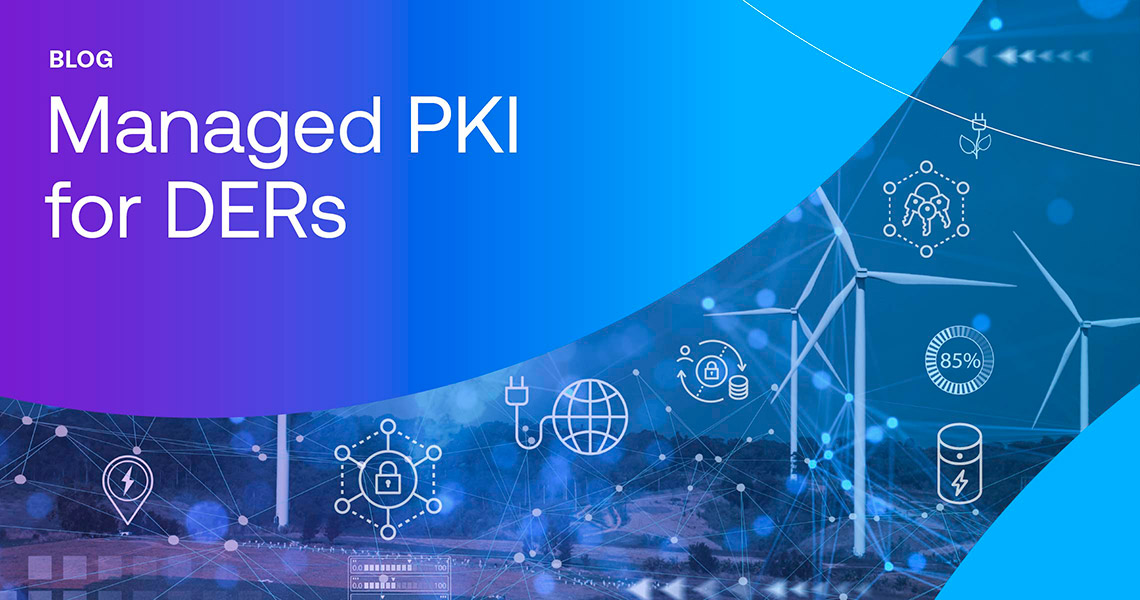Imagine a world where billions of devices seamlessly interact with servers and one another, exchanging data, receiving updates, and executing complex functions autonomously. This interconnected ecosystem, known as the Internet of Things (IoT), is rapidly expanding and transforming industries and everyday life.
By 2025, an estimated 75 billion IoT devices will be in operation across various sectors, including healthcare, automotive, and smart homes. These devices hold the promise of enhanced efficiency, convenience, and innovation. However, the scale and connectivity of IoT also present significant security challenges. Unsecured devices can serve as entry points for cyberattacks, allowing malicious actors to steal sensitive information, manipulate device operations, and even compromise entire networks and infrastructures.
Public Key Infrastructure (PKI) plays a crucial role in mitigating these risks by establishing a secure framework for IoT ecosystems. PKI enables manufacturers to assign unique digital identities to devices, ensuring secure communication, authentication, and data integrity. This security framework remains effective even after devices leave the manufacturer’s control, offering ongoing protection throughout the device lifecycle.
Manufacturers can choose between developing an in-house PKI system or outsourcing to a third-party managed PKI service. While in-house solutions provide control, they require substantial investment in infrastructure, expertise, and ongoing maintenance. As a result, many organizations opt for managed PKI services, which offer a cost-effective and scalable alternative, allowing manufacturers to focus on innovation while ensuring robust security measures are in place.
Evolution of energy management with distributed energy resources (DERs)
The energy industry is undergoing a transformation as Distributed Energy Resources (DERs) like solar panels, wind turbines, and energy storage systems become more prevalent. According to Wood Mackenzie, the US DER market will nearly double from 2022 to 2027, reaching US$68 billion per year. This surge in DERs is reshaping energy management by decentralizing power generation and increasing grid resilience. However, with this evolution comes the challenge of securely integrating these distributed assets into the existing energy infrastructure. Ensuring the security and integrity of DERs is critical, and Public Key Infrastructure (PKI) plays a central role in creating a secure ecosystem for these assets.

The role of PKI in securing DER ecosystems
As DERs become more integrated into the energy grid, the security of these assets becomes increasingly critical. A study by the Ponemon Institute found that 54% of organizations experienced a cyberattack on their industrial control systems in the past year, highlighting the vulnerability of critical infrastructure. PKI is essential for mitigating these risks, providing a secure foundation and root of trust for DER devices and communications. The top three security benefits are:
- Device authentication. PKI ensures that only authorized devices can connect to the energy network, preventing unauthorized access that could lead to disruptions or data breaches. Each DER device is issued a digital certificate that serves as a unique identifier, enabling secure and trusted interactions within the grid.
- Data encryption. The data exchanged between DERs and control systems is often sensitive, containing information about energy production, consumption, and grid conditions. PKI enables encryption of data, making it inaccessible to anyone who intercepts it. This encryption is crucial for protecting the confidentiality of energy data and maintaining the integrity of grid operations.
- Data integrity. In addition to encrypting data, PKI ensures that the data received by DERs is accurate and has not been tampered with during transmission. This is achieved through cryptographic hashing, which creates a unique fingerprint for each data packet. If the data is altered, the hash will not match, alerting the system to potential tampering.
What is a managed PKI service?
Managed PKI services offer organizations a way to outsource the complexity of PKI management. Rather than investing in the infrastructure and expertise needed to manage PKI internally, organizations can leverage managed services to ensure their DER assets are secured by industry best practices.
- Scalable. Managed PKI services are designed to scale with the growth of your DER network, accommodating the addition of new devices without requiring significant internal resources. This scalability is essential as the number of DERs continues to rise, with some projections estimating that global DER capacity could reach 500 GW by 2030.
- Advanced security. Managed PKI providers stay ahead of emerging threats by continuously updating and patching their security protocols. This proactive approach is vital in a landscape where cyber threats are constantly evolving. A report by Cybersecurity Ventures predicts that cybercrime will cost the world $10.5 trillion annually by 2025, making robust security measures more critical than ever.
- Cost effective. Implementing a PKI solution in-house can be expensive, requiring significant investment in both technology and personnel. Managed PKI services offer a cost-effective alternative, reducing the total cost of ownership while providing access to cutting-edge security features. According to Forbes, companies that adopted managed PKI services reported a reduction in operational costs compared to those managing PKI in-house. Should we mention OPEX and CAPEX savings, since you are not on the hook to host the service, or buy the hardware or software
- Regulatory compliance. Energy providers must comply with a range of regulations, including the North American Electric Reliability Corporation (NERC) Critical Infrastructure Protection (CIP) standards. Managed PKI services are often better equipped to meet these regulatory requirements, helping organizations avoid fines and ensure compliance with industry standards.
What makes up a modern managed PKI service
A modern managed Public Key Infrastructure (PKI) service provides a comprehensive, secure, and scalable solution for businesses aiming to protect their IoT ecosystems, digital communications, and data integrity. By addressing key areas such as certificate design, key management, compliance, and user experience, managed PKI services help organizations meet the ever-evolving security demands of the digital age.
Certificate design and PKI architecture
Managed PKI services assist organizations in designing certificates tailored to specific needs while ensuring compatibility across diverse systems and applications. This includes support for various certificate formats and selecting the right attributes to balance security, privacy, and usability. Built for scalability, modern PKI architectures incorporate redundancy and high availability to maintain resilience against potential failures. Additionally, network security is prioritized, safeguarding communication channels between PKI components.
Key management and security
A managed PKI service offers secure key generation using hardware security modules (HSMs) and other advanced cryptographic methods. Secure key storage, robust key rotation mechanisms, and efficient certificate revocation processes (such as Certificate Revocation Lists (CRL) and Online Certificate Status Protocol (OCSP) responders) are standard features. Physical security measures, like secure facilities with strict access control, further protect the sensitive operations of the PKI system.
Compliance, policy, and identity verification
Managed PKI services ensure adherence to strict security standards and regulatory requirements. They facilitate the creation of certificate policies and certification practice statements that govern PKI operations, ensuring compliance with industry standards such as WebTrust certifications. Regular audits are conducted to verify security practices. On the registration authority (RA) side, strong identity verification protocols are implemented, preventing unauthorized certificate issuance and ensuring the integrity of the PKI system.
User experience and integration
A key strength of modern managed PKI services is their focus on ease of use. Automated certificate management processes reduce administrative burden, while training programs and awareness campaigns enhance employee and user understanding of PKI security practices. These services seamlessly integrate with existing IT infrastructure, applications, and services, ensuring minimal disruption. Continuous monitoring, coupled with a robust incident response plan, further enhances security, providing businesses with peace of mind as they scale and manage their digital assets.
By choosing a managed PKI service, organizations can leverage a powerful, secure, and scalable solution that not only meets today’s security requirements but is also future-proofed against emerging threats, including the adoption of quantum-safe algorithms.
Protecting the future of energy with Intertrust PKI
As the energy sector continues to evolve with the growth of DERs, securing these assets becomes increasingly important. Intertrust’s managed PKI service offers a robust, scalable solution that ensures the security and reliability of DER communications. By investing in a managed PKI service, energy providers can focus on their core operations while leaving the complexities of PKI management to experts. For utilities, DER aggregators, and energy providers, Intertrust provides the tools needed to secure the future of energy.
This blog outlined some of the key advantages of a modern managed service. Stay tuned for our next blog where we examine what you should look for when choosing one.
